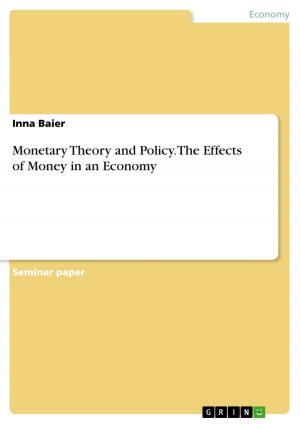The role of theming in the event creation process
Business & Finance, Management & Leadership, Management| Author: | Nico Schulenkorf | ISBN: | 9783638034562 |
| Publisher: | GRIN Verlag | Publication: | April 10, 2008 |
| Imprint: | GRIN Verlag | Language: | English |
| Author: | Nico Schulenkorf |
| ISBN: | 9783638034562 |
| Publisher: | GRIN Verlag |
| Publication: | April 10, 2008 |
| Imprint: | GRIN Verlag |
| Language: | English |
Seminar paper from the year 2005 in the subject Business economics - Business Management, Corporate Governance, grade: High Distinction, University of Technology, Sydney (School of Leisure, Sport and Tourism), course: Event Creation Workshop, 19 entries in the bibliography, language: English, abstract: Staging an event means bringing together all the elements of a theatrical production for its presentation on stage - be it a once-off event or a recurring festivity. As the theme is the decisive factor to distinguish specific events from each other, event organisers have to focus on 'theming and design' as the central part of the event creation process. In order to produce successful special events, managers are supposed to combine creative ideas, past experiences and analytical research into a strategic management planning process (Johnson, 2005). Focusing on the target audience, the theme and congruent design support the individual processes, which determine the quality of the event experience and its overall emotional impact (Allen and Harris, 2002). This essay will highlight the role of theming as the critical success factor for events. In sections two and three, the place, role and importance of emotional 'theming and design' in the development process of an event will be discussed. Section four gives an overview of the sources of theming in event management. The variety of event themes and ideas are analysed in section five, where special attention is given to sporting events. This part further explains how event suppliers for 'theming and design' can be identified and managed accurately. The outcomes of this discussion are then applied to a practical example. Following the analysis of theming in event marketing, this essay, in the final section, reaches a conclusion based on theoretical and practical evidence. When creating an event, organisers need to concentrate and emphasise on the first two phases of the event management process (cf. figure 1). During the research and design stages, the framework of the event is established, which can be referred to during the later stages of the management process. Successful event creation therefore builds a solid basis for future actions (Allen and Harris, 2002). Theming is the central element of the strategic implementation process for any event. Once a decision has been reached on the overall concept, it should be developed into a theme that shapes and unifies all aspects of the event. The theme will determine the overall look, style, colours, sounds and atmosphere which are crucial for a unique event experience (Allen and Harris, 2002).
Seminar paper from the year 2005 in the subject Business economics - Business Management, Corporate Governance, grade: High Distinction, University of Technology, Sydney (School of Leisure, Sport and Tourism), course: Event Creation Workshop, 19 entries in the bibliography, language: English, abstract: Staging an event means bringing together all the elements of a theatrical production for its presentation on stage - be it a once-off event or a recurring festivity. As the theme is the decisive factor to distinguish specific events from each other, event organisers have to focus on 'theming and design' as the central part of the event creation process. In order to produce successful special events, managers are supposed to combine creative ideas, past experiences and analytical research into a strategic management planning process (Johnson, 2005). Focusing on the target audience, the theme and congruent design support the individual processes, which determine the quality of the event experience and its overall emotional impact (Allen and Harris, 2002). This essay will highlight the role of theming as the critical success factor for events. In sections two and three, the place, role and importance of emotional 'theming and design' in the development process of an event will be discussed. Section four gives an overview of the sources of theming in event management. The variety of event themes and ideas are analysed in section five, where special attention is given to sporting events. This part further explains how event suppliers for 'theming and design' can be identified and managed accurately. The outcomes of this discussion are then applied to a practical example. Following the analysis of theming in event marketing, this essay, in the final section, reaches a conclusion based on theoretical and practical evidence. When creating an event, organisers need to concentrate and emphasise on the first two phases of the event management process (cf. figure 1). During the research and design stages, the framework of the event is established, which can be referred to during the later stages of the management process. Successful event creation therefore builds a solid basis for future actions (Allen and Harris, 2002). Theming is the central element of the strategic implementation process for any event. Once a decision has been reached on the overall concept, it should be developed into a theme that shapes and unifies all aspects of the event. The theme will determine the overall look, style, colours, sounds and atmosphere which are crucial for a unique event experience (Allen and Harris, 2002).















